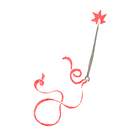Teaching Philosophy
|
It is not easy being a new student of Information Studies. When our initiates tell family and friends of their educational path, they may be greeted with a perplexed expression and a skeptical “What’s that?” The study of information is not obvious; it requires what Marcia J. Bates calls a meta-perspective, a distinct way of seeing that transcends surface meanings to the informational patterns therein. After 30 years as an educator in Information Studies, Bates asserts that it takes newcomers at least one vexing and tumultuous semester to refocus their vision on information phenomena. Once this meta-perspective is obtained, though, our students are uniquely empowered to solve the problems and realize the opportunities of the Information Age, whether in libraries or other sites of knowledge work.
For starters, my teaching is a carefully crafted, multi-media, interactive performance. Given that my students are relatively new to information science and lack subject knowledge, my classes open with a lecture (usually 90 minutes) to introduce major ideas and place them in historical and social context. These presentations have clearly stated themes and an easily followed narrative arc. I apply several tricks to make the abstractions of Information Studies friendly and concrete. I use PowerPoint to display the most important concepts in vivid, memorable ways. I offer precise definitions and then explore them in terms of familiar, sometimes funny everyday happenings. I integrate video or musical snippets and constantly circulate real artifacts. Acknowledging the physical dimension of learning, I sometimes direct students to move their bodies in ways that transmute key tenets. There is usually a surprise element at some moment in my lecture, whether a contest or personal story shared in confidence. Even my clothing is coordinated per session, for I am a lead actress in what I hope is a blockbuster learning show. Typically, lectures are followed by a break; once refreshed, students participate in small group activities involving discussion, role-playing, and impromptu presentations that are an opportunity to process the lesson individually and among peers.
Since my research agenda explores the crossroads of information and pleasure, it seems appropriate to guide students into information science in a spirit of wonder and delight. Yet, in a reflexive mode, I wonder: Do I make learning too easy or entertaining for our students? Do I suggest precision and consensus around concepts where there is none? Is my approach too structured or controlled? To remain open to input and change, I monitor my course evaluations, I attend training sessions at the Office of Teaching Advancement, and I participate in Faculty curriculum planning efforts where my philosophy is expressed and sometimes challenged. Thankfully, at the Faculty of Information we believe that divergent approaches to learning about information are both stimulating and necessary.
|

